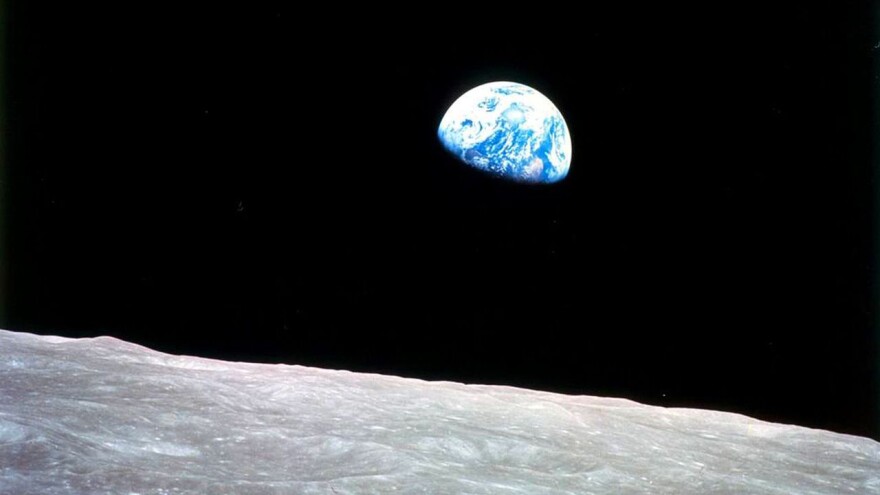In 1968, the world got its first real look at itself in the photograph Earthrise, taken on Christmas Eve by Apollo 8 astronaut Bill Anders. Author and environmentalist Bill McKibben discussed this in his book Eaarth, Making a Life on a Tough, New Planet. That’s Earth with an extra A, because as McKibben also states, that planet, looking so pristine in its first photograph almost six decades ago, isn’t the same one we’re living on now.
Massive storms, deadly heat, rampant wildfires, and annual “once-in-a-century” floods now dominate the news cycle. When I moved to rural LaPorte county just 20 years ago, the seasons were more distinct. Throughout December, January, and February, we’d open our back door and set out across the fields on our cross-country skis with our kids. This winter, we got two weekends to ski.
I also walk many miles per week, even in the winter now that there’s such a dearth of snow, and another observation I’ve made is a nearly constant wind. In the summer, I’m grateful for it, but I also know that it’s climate-related and likely a permanent change in weather patterns. Storms are heavier, windier, and the farm fields I walk beside are often either flooded or parched. There’s very little in-between.
I was just a kid when Earthrise was taken. I won’t drone on about the good, old days, because they weren’t for women and people of color. Sure, we took our glass pop bottles back to the store for a deposit before the ubiquity of single-use plastics. We also rode around in cars with massive, gas guzzling, lead spewing engines. They were gorgeous cars, works of art, but they were the antithesis of environmentally friendly.
Four years ago, the world was in the midst of a global pandemic, which has since become endemic. We hit pause on our lives as we knew them. It wasn’t just a pandemic we weathered, though. We got a glaring look at the true effects of income inequality as essential workers bore the burden middle class and rich people did not. A lot has shifted in the last four years, and we’ve shown our ability to adapt to a shifting reality.
Just six months into the pandemic, a National Institutes of Health study reported on the positive environmental benefits from the lockdown, including improved air and water quality as people reduced their consumption, travel, and those who were able to transitioned to remote work. I’m one of the lucky ones who worked fully remote during the pandemic, and I now work hybrid schedule that affords me a life-work balance I couldn’t have imagined pre-pandemic.
No one would ever suggest a return to lockdown for any reason except an emergency, but we could take the lessons we learned and use them for the greater good. One way would be to eliminate rampant consumerism from our lives. The concept of more, now, and again is so tiring, so unsustainable. I never bought into the idea of retail therapy. Understanding the difference between a need and a want is such an underrated life skill. As Kurt Vonnegut noted in his biting satire, Breakfast of Champions, “The planet was being destroyed by manufacturing processes, and what was being manufactured was lousy, by and large.”
We could also redefine our notion of leisure and immerse ourselves in nature through photography, backpacking, hiking, and other activities that have a lower carbon footprint. Many people rediscovered their love for the outdoors during the pandemic, when social distancing was the norm and being outside felt safer than crowed places.
As we approach another Earth Day, we can attend events aimed at getting us to reduce, reuse, and recycle, but our collective efforts are minuscule compared to what we could do if corporate America focused on the greater good instead of bottom line. It’s also worth noting that it’s the poor that bear the greatest burden of the effects climate change. Many of the migrants I met on my volunteer trips to the U.S. Mexico border weren’t just fleeing violence, they were fleeing a homeland decimated by climate change, one in which they hadn’t been able to grow crops in five years or longer.
We need an Earthrise! Corporations need to take responsibility for their roles in polluting the planet and contributing to the climate crisis. Eliminating single-use plastics and reducing fossil fuel consumption is just a start. Green job creation and green energy endeavors will probably happen because of the tax breaks new industries like these will garner for corporations focused on their public image and their bottom line.
According to 2023 data from the National Oceanic and Atmospheric Administration, the Earth’s surface temperature has warmed by approximately 1/10 of a degree per decade since the industrial revolution began in 1850. Over the past 40 years, that number tripled to over 1/3 of a degree per decade. The impact of this acceleration on the climate is evident. I hope we can learn to live in harmony with rather than dominion over our common home before it’s too late.
Music: "I'm Amazed" by My Morning Jacket




